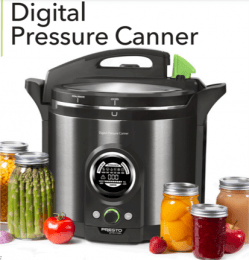
Many questions have been received about the Presto Digital Pressure Canner. Here is advice, shared with permission, from the University of Georgia National Center for Home Food Preservation.
Presto is a well-respected and conscientious name in the industry. The University of Georgia has not independently verified their marketing statements for you at this time. If someone wants to use this canner, they have to be willing to trust the manufacturer at this time.
Presto has carried out the research on their own to make the claim that the appliance meets USDA guidelines for processing, and so it is up to the company to stand behind it. The type or extent of research Presto has done is not available.
It does seem like Presto is aware that they have to meet a minimum temperature inside the canner, not just a pressure, which is a positive indication.
The Presto instruction booklet does not contain at least two USDA low acid processes that have special canner and water level requirements in the canner different from other low acid canned foods in the USDA manual. Therefore, follow the Presto instruction manual and not directions from other sources including the USDA book or the NCHFP if you are going to use it. They do put full instructions for preparing and processing foods in their user manual, which is also a positive approach.
One can read through the online instruction manual to see how the canner operates and the features built into the appliance.
Other questions about their research will have to be directed to Presto at this time.
The National Center for Home Food Preservation does not recommend or approve any specific brand of canners. The USDA also does not approve specific home appliances or canners. If you have noticed the little USDA round seal on some of the Presto promotional materials, that symbol was developed by Presto and is not an official USDA seal. It does not indicate USDA approval. (Even official USDA symbols, which this is not, are not allowed to be used by anyone to imply or endorse a commercial product or service.)
Source: The National Center for Home Food Preservation, March 2021